Bitcoin Private keys: Why should you save it as your life?
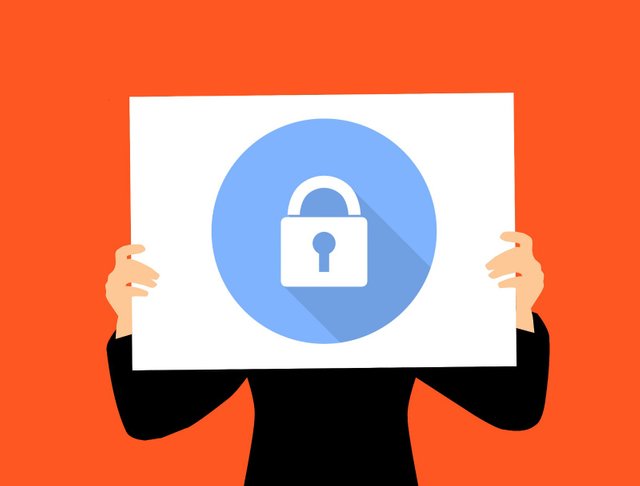
Did you know that private keys that you submit on an exchange platform is directly giving them access to your cryptocurrencies? Did you know that whoever has your private key has your bitcoins?
Yes, you read it right.
One of the brightest minds in cryptoverse has this say on private keys:
“The private key must remain secret at all times because revealing it to third parties is equivalent to giving them control over the bitcoins secured by that key. The private key must also be backed up and protected from accidental loss, because if it’s lost it cannot be recovered and the funds secured by it are forever lost, too.”― Andreas M. Antonopoulos,Mastering Bitcoin: Unlocking Digital Cryptocurrencies
In this post, we will share everything you need to know on Private Keys. Considering the importance of private keys, we decided to write a dedicated post on it.
That being said, let’s dive in right away.
As part of this post, we will be touching two portions of Cryptocurrency wallets
- Private keys(address)
- Public keys(address)
To make you understand this, consider this example. You need to get in touch with someone on Facebook and that person is not on your friend list. So you find the person by their username and send a message.
This username is public key(address)
Now, the other part of the story is that user finding that message. How can that user find that message? Login to Facebook with his/her password (which only they know) and read the message and do the needful.
This password is the private key(address)
Now a question, do you expect the person to share their password instead of username? You yourself don’t share your password, do you?
No, a big no.
That password is a responsibility and not just an alphanumeric set of characters.
Now that you understand the most basic concept, let’s begin the flow now.
A private key is an alphanumeric set of characters that absolutely randomly generated. Like the password is needed to access message sent on Facebook, the private key is needed to access the Cryptocurrency. For the sake of this post, we will use Bitcoin as an example.
Whoever has the private key has direct access to your Bitcoins. The private key is cent percent unique and is 256 bit long. The uniqueness of the private keys is taken care by the cryptographic functions of the wallet you choose to use.
This is how Bitcoin address looks like, it starts with 5 always.
5Kb8kLf9zgWQnogidDA76MzPL6TsZZY36hWXMssSzNydYXYB9KF
What Is A Public Key/Address?
Another Cryptographically generated based on the private key. There is no tool or algorithm to reverse engineer the private key using the public key.
This is like the username (not literally) and unlike the username, no one can figure out your identity using a public key. It’s simply used to send bitcoins, that’s it.
This is how Bitcoin address looks like, it starts with 1 always.
1EHNa6Q4Jz2uvNExL497mE43ikXhwF6kZn
This address is always seen and is visible on the blockchain network of the respective cryptocurrencies. If you take a look at a typical bitcoin transaction, you’ll notice a couple of details. In the scope of this post is the public keys. And from that transaction, you’ll notice that there will be two public keys: Sender’s & Receiver’s.
What is the use of Private Keys?
As aforementioned, private keys are used to make transactions that are irreversible. The private keys are here to send and receive bitcoins from anywhere and anyone. The mathematical functions behind the transaction generate signatures that directly linked to your private key.
Again, there is no way to figure out the private key using the signatures of the transactions. There’s signature for every transaction and each one is unique for every private key. This uniqueness makes it impossible for anyone to copy the signatures and duplicate transaction, or double spend it.
This way, you can fearlessly use the same private key to send & spend any number bitcoin. Isn’t it cool? Furthermore, the mathematically generated signatures are particularly linked to one account. In other words, each private key has unique signatures that are specifically linked to only one private key or account.
This way, the system not only avoids duplicacy but also the chances to figure out private key using the signatures. The signatures are as random as you can imagine.
Here’s a pictorial representation of a Bitcoin transaction for nerds.
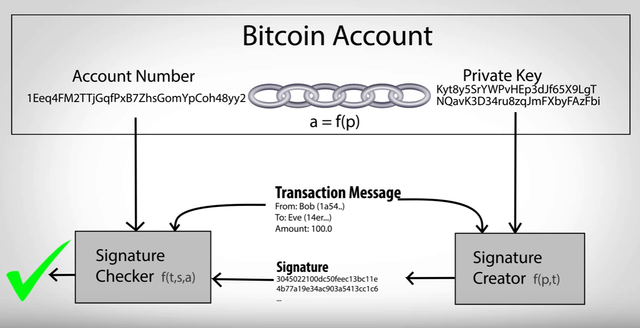
If you don’t understand this, it’s absolutely fine. You can still make transactions with tap/click of a button.
If you’re new to cryptoverse and is fascinated about cryptocurrency trading, we would like to tell you one thing. Whoever has your private key, owns those funds. Including the exchanges, you keep your digital funds in.
We’re not telling you that the exchanges are going to loot your funds. But as long the exchange platforms are not decentralized exchanges there is a risk of losing the cryptocurrencies you own. If not the exchange platform itself, but someone would break into the system and steal those private keys to easily access all the funds.
Sure, the current centralized exchange platforms are powerful enough to withstand attacks. At the end of the day, it is a centralized system with a single point of failure, which the hackers attack and steal critical information. This results in cryptocurrency hacks that shake the industry from its soul.
Not just beginners, everyone is the cryptoverse has one common question,
How To Keep Private Keys Safe?
As you must already know, private keys are generated by the digital wallets and are stored in the wallet as long as you use it. Speaking of wallets, there are a lot of wallets that you can use to store multiple cryptocurrencies. Out of which, some allows you to personally guard your private keys and some takes care of your private keys on their system.
In the second case, you risk all your funds. Although the wallets owners may not be fraudsters like Freewallet is accused to be.
Considering the sensitivity of the monetary value involved in this space, we took out some time and dug around to find the best cryptocurrency wallet to store cryptocurrencies. We’ve listed the wallets categorically to make it easier for you to find what suits you the best.
Let’s begin
Best web-based & mobile-based wallets to store cryptocurrencies
As mentioned earlier, the wallets enclosed herein store your private keys on their servers on your behalf. However, they are encrypted and only you can decrypt the private key. This happens automatically, you don’t have to do anything to decrypt it.
Mobile Wallets
For Android OS
- Coinomi
- SamouraWallet
- Edge
- MyCelium
- Jaxx
For iOS OS
- BreadWallet
- CoPay
- Edge
- Jaxx
- Bitpie &
- Blockchain
Sure these wallets put extra focus on security but that doesn’t stop them from being hacked. Everyother day there’s news on exchanges being hacked. Slowly but surely, these systems will switch to decentralized exchange and/or wallet platform. Until then, you are risking your digital assets big time.
MyCelium is considered to be one of the top-rated wallets when it comes to security and adaptability to hardware wallets like Ledger and Trezor.
Many of you don’t trust mobile phones, or just don’t find it reliable or durable. For them, there are desktop wallets which are way better & safer than mobile wallets are. Let’s take a look at it now.
Desktop Wallets
Bigger screens, better opportunities. Desktop wallets are more popular among beginners for a reason. First, it is way more easy and user-friendly to adapt to the flow desktop wallet has. Second, its way safer. Unlike the mobile wallets, desktop wallets let you download the private key as portable file and have it where ever you feel safe. You can move it to a remote desktop/laptop that doesn’t connect to the internet often.
Furthermore, you can store these passwords in a password protected folder on your hard drive or an external memory stick. Basically, on a desktop based wallet, you can take the downloadable file containing the private key, as far as possible from the internet.
But make sure you don’t lose the file at any cost. Create multiple copies and remember where you’ve saved it. If you lose the file, you lose the private keys and hence your bitcoins. Since the bitcoin private address is not easy to remember, you have to have it accessible easily.
Here’s a list of desktop-based cryptocurrency wallets. Review of which will be posted in coming weeks.
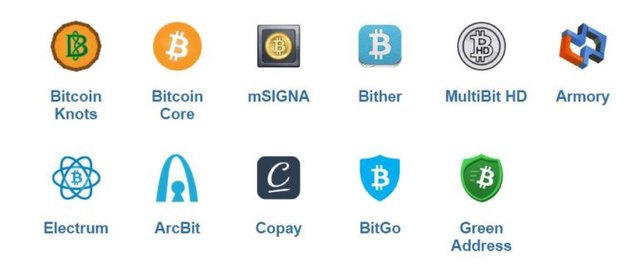
Hardware wallets
Cryptoverse is so important and valuable industry that there are so many innovations coming up lately. One such innovation is hardware wallets for storing cryptocurrencies. The sole purpose of the hardware is to take your digital funds and private keys miles away from the internet.
Security on the internet is a myth. Anything that’s connected to the web is pretty much hackable and is highly vulnerable. The hardware wallets take your most important elements towards absolute offline space.
No one can hack into it as the hardware cannot read other than cryptocurrency code. Therefore, there is no room for any other code from hackers to make difference. Furthermore, even if you lose the device you can retrieve the funds stored in the hardware wallet provided you have the backup code stored somewhere outside the hardware wallet.
Let us show you some of the most popular hardware wallets in this industry.
#1 Trezor
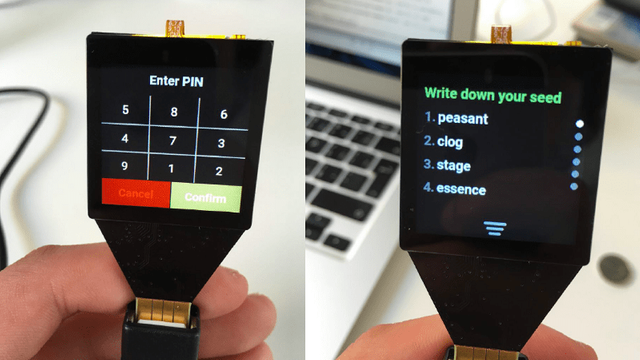
First of its kind and still the best. Though there isn’t too much of competition in hardware wallet space, Trezor has maintained a lot of quality in terms of security features and compatibility. The wallet is as small as a basic mobile phone yet as powerful as a US Army.
You can connect the wallet to your computer via a USB cable. Once you connect you will need to enter a pin and seed key that you’ve set at the first place (Trezor setup guide coming soon)
As this device connects to the internet only when you’ve to transfer funds from exchange platforms to this wallet, there is only one way you can lose your funds to someone from hardware wallet, it’s when you yourself give security pin and keys to someone.
Ledger Nano S
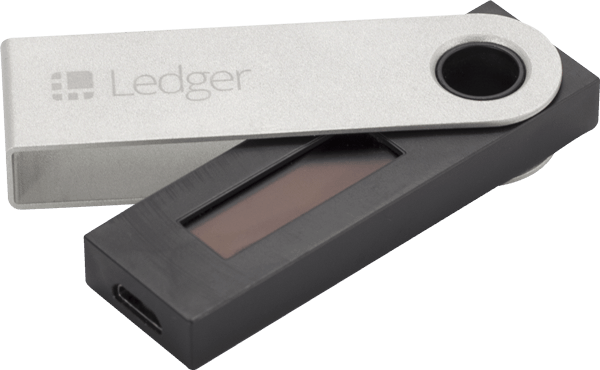
Most popular hardware wallet, Ledger Nano S is most used hardware wallet in the cryptoverse. The compact size of the wallet, compatibility, security features, and user-experience has taken it to become the best hardware wallet to store cryptocurrencies.
Forget mobile phones, this hardware wallet is as small as a pen drive yet it can store up to 30 different cryptocurrencies and any number of accounts. It’s a one-time investment and your fund will be safe happily ever after.
A couple of awesome features about Ledger Nano S is:
- It can be used on an infected computer too
- The process of approving a transaction from your end is completely manual. That is, you need to press two buttons together to approve a transaction. Transactions do not get approved on the software end with a click of a button. Hence eliminating the possibility of any hacker attacking your transactions.
As aforementioned, this hardware wallet is compatible with 30 cryptocurrencies and almost all top performing exchange platforms. This makes it really easy for the users to buy cryptocurrencies from a wide range of exchange platforms yet transfer it to the Ledger Nano S.
Note: There are many fraud & fake products of this hardware wallet. Make sure you buy it from the official website only.
#3 PaperWallet (cold storage)
Considering the insecurities, what if there was a way to avoid the internet completely. Sure, there is, it’s called paper wallet or cold storage in other words. We call it paper wallet because the private keys & public keys (sometimes) are printed on a piece of paper. Literally, the keys are on a piece of paper and that is an effective way to keep the bitcoins safer from any attack.
Alternatively, we call it cold storage as this method is used when you don’t want to use the digital assets frequently. We put something in cold storage when we want to store something for a longer period of time. These paper wallets are completely offline and it is cent percent safe for long storage.
But you’d ask, how to create a paperwallet?
Well, you can use bitaddress.org to create your own paperwallet and keep you digital funds in a cold storage for a longer period of time. bitaddress.org is a simple HTML page that helps you create paperwallet. You can save the HTML page of your bitcoin address offline and stay away from the internet. Once downloaded, you will be able to carry it on a USB stick or offline on a laptop.
The ecosystem of the paperwallet is crafted in such a way that whoever has the private keys, is the owner of the funds. There is no other verification element other than private keys. That’s why it is really important to have private keys safe.
Over to you. How do you keep your digital currencies safe? Do you use exchange platforms? Or do you use hardware wallets? Beyond this, how do you keep private keys safe? Let us know in the comment section below. We hope, our attempt at making your digital assets safer was good. Do us a favor. Share this article in your network and help others understand the significance of private keys.
Originally published at https://www.bitfolio.org/bitcoin-private-keys.